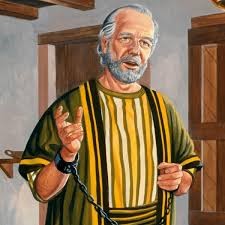Session 20 - 2 Timothy
Author
Paul. This is his second letter to Timothy. Paul was in prison at the time, for his faith.
Date of Composition
Around 64 AD.
Purpose and Audience
"This letter is from Paul, chosen by the will of God to be an apostle of Christ Jesus. I have been sent out to tell others about the life he has promised through faith in Christ Jesus. I am writing to Timothy, my dear son. (1:1-4).
Paul wishes to write to Timothy (possibly his closest companion) before he dies. After his first letter to Timothy, he was arrested again in Greece or Asia Minor and taken back to Rome. It appears that he has gone through another legal trial (4:16). He is suffering in chains, in a cold dungeon (cf. 1:16; 2:9; 4:13). The letter is quite personal; he mentions 23 individuals. There is a sense of the end coming:
"As for me, my life has already been poured out as an offering to God. The time of my death is near. I have fought the good fight, I have finished the race, and I have remained faithful. And now the prize awaits me—the crown of righteousness, which the Lord, the righteous Judge, will give me on the day of his return. And the prize is not just for me but for all who eagerly look forward to his appearing." (4:6-8
This may be the last time Timothy ever hears from Paul, who writes to encourage him to continue in the work of the ministry.

What would your last advice be?
Structure
| Greetings | - | 1:1-2 |
| Encouragement in Light of Paul's Situation | - | 1:3-18 |
| Exhortation to be strong and do the work of God well | - | 2:1-26 |
| Living and overcoming in the last days | - | 3:1-4:8 |
| Concluding Remarks | - | 4:9-21 |
| Final blessing | - | 4:22 |
Key Issues
Christian Leadership
Authenticity and commitment to Christ are foundational to effective Christian service.
Leadership is not just a gift - but also a developed life. It doesn't function through position alone, but relationship. It occurs when a person leads and others decide to follow. If no one is following. you are simply taking a walk. While good order is important, God's method for building His church is leaders - not committees. Revival and trials are often God's ways of uncovering new leaders. Leadership development involves focusing on developing people and their ministries. Focuses on influencing others to understand and do the will of God, and taking them there. God is committed to leaders, eg worked on Moses before sending back to Egypt; watched Joseph growing in prison; revealed Himself when they were ready. Leaders need to be students of leaders who influence people for God. Leaders raise up leaders. Learn how to walk as God's leaders in the nation; pay the price to develop. Prepared to be people of greater influence, but to work under authority. New leaders are often not recognized by old leadership. Christian leadership honours God.
 OR
OR 
Popular leadership or Godly leadership - I know which one I prefer.
More than ever we need good leaders. Not just people in roles, with jobs to do, but men and women who will own and share real vision, build strong teams, provide direction and standards, train, mentor and shepherd others, create a positive and supporting culture, establish a strong ethical framework, and lead through times of change. Such people do exist - and you can be one of them.
2 Timothy contains additional criteria for good leaders in the Christian community.
Instead of being grateful for warm bodies to fill jobs and meet organizational needs, selection and training of leaders (at any level) involves encouraging people to clarify their gifts and callings, refine their character and reliably serve the Christian community.

More Leadership Lessons
| Serve God with a clear conscience. | 1:3 |
| Pray constantly for those you lead. | 1:3 |
Fan into flames the spiritual gift God has given you.
It is easy to lose initiative and stop using our gifts. Cultivate what God has given you. Keep the fire going. Never lose your enthusiasm for the things of God. Never stop serving Him. If you have become slack, do not lose hope, stir up the gift you have, because it is in you.
| 1:6 |
Be confident of your specific calling in God.
Don't seek to become like others. That only foments competition, comparisons and dissatisfaction. The One who calls us is the same, but our giftings and callings are diverse; you will only be confident, focused and effective if you do what you have been equipped to do. Ask the Holy Spirit for direction.
| 1:11 |
Keep a strong discipline around your life.
Too many good or promising leaders have ended up shipwrecked because lack of discipline allowed sin to enter their lives and harm their lives, families and reputations. Better to develop strong personal disciplines than put all at risk. Take time out to check where you are at, what risks are apparent and how to deal with them. Many leaders find it helpful to have someone/s they trust, and to whom they are accountable.
| 2:1-8 |
Keep what you have learned from senior leaders as the pattern of sound teaching, with faith and love in Christ Jesus; do this in the power of the indwelling Holy Spirit and the grace of God through Christ. It takes humility to learn from others, but this is the only way we will grow.
The call to Christian to leadership is a call to a life-long pursuit of God. There should always be an insatiable desire - a longing - for more of Him.
Paul exhorts Timothy to "fan into flame" (re-kindle) the gift on his life. He did not suggest that Timothy find someone who could do this for him.
There comes a time in our spiritual journey when we must take responsibility for our own maturity in God. No longer is it the responsibility of another leader or mentor.
Christian leadership can be tough; it can be disheartening; the temptation to give up is recurrent, and many do so. We can only re-kindle the call and the fire within us by prayer and with the help of the Holy Spirit.
Sometimes the encouragement to do so comes from others, who can see what is going on and genuinely care for us as leaders.
| 1:13; 2:1, 6 |
Be committed to teaching, mentoring, trusting and releasing reliable people who will then do so in the lives of others.
Leadership multiplies itself. Good leaders have shelf lives. When they go, they should not leave a vacuum behind them; this happens when they are persuaded that only they are able to lead, and as a consequence do not invest in and release others.
Leadership is an opportunity to pioneer, create paths and opportunities for others to stand with us, trust them to do the work with us, then watch as they take on the mantle.
Jesus was a good picker and discipler of men. Having trained them, He sent them out to do His work.
| 2:2 |
Recognize the need for focus, discipline, patience and endurance in personal and church life.
Avoid things that will entangle you and take you away from your calling. This must be enhanced by time to reflect, think and pray alone, journal what God is saying on an individual basis, receive input from others, and plan.
| 2:3-7, 10 |
| Provide solid teaching and instruction for the whole church
| 2:14 |
| Work hard to acquire the skills to accurately handle (literally direct, handle correctly, keep on a straight path) God's word of truth. Don't be afraid of hard work.
| 2:15 |
| If we live right before God we will be in a better place for Him to use us
| 2:21 |
| Be an example of purity, faith, love, peace; not quarrelsome (engaged in "stupid and senseless controversies" that only "breed quarrels", NRSV; these sap vital strength from the real work of the Kingdom and end up hobbling the church); kind, able to teach; not resentful; willing to gently teach those who do not agree with them.
| 2:22-26 |
| Avoid the lifestyles of those who live in sin.
| 3:1-9 |
| Be an example of good teaching, faith, patience, love, endurance even in the face of persecution.
| 3:10-12 |
Depend on God's inspired Word for teaching, rebuking, correcting and training in righteousness.
A called leader will delight in meditating on God's Word. Effective Christian leadership is also competent leadership.
Sometimes the leader will need to get involved to correct false teaching creeping into the church.
| 3:14-17 |
Commit to preaching the Word, "in season and out of season"; correcting, rebuking and encourage others - with great patience and careful instruction, based on sound doctrine.
Effective Christian leaders do not give up on their God-given passion and let the work grind to a halt. They are conscious of the importance of timing; they are motivated to listen to (and reflect) what the Holy Spirit is saying about the moment.
Leaders use relationships wisely, to correct, teach and train others, so that the work continues to grow and be fruitful.
False teaching and false teachers will present themselves, but Godly leadership will keep the church on track.
| 4:2-3 |
| Keep a clear mind in every situation.
| 4:5 |
Keep the faith - there is an eternal reward.
Real change, transformation and resilience are the work of the Holy Spirit. We cannot bring about change by a strong, apologetic argument alone - it must be accompanied by the power of the Holy Spirit. Paul urges Timothy not to get involved in arguments but rather, to gently instruct.
"Winning" is not in the argument but in the gentle sincerity that comes with the Spirit at work in your life.
| 4:5-8 |
Other Themes
Other themes of 2 Timothy include:
Paul's Ultimate Faith in God
"I am suffering here in prison. But I am not ashamed of it, for I know the one in whom I trust, and I am sure that he is able to guard what I have entrusted to him until the day of his return." (1:12).
This verse is often quoted, in order to encourage us to keep our hope in Christ, who alone can keep us . The context, Paul's imprisonment and pending execution, is often forgotten. When the rubber hits the road is when we discover the power of the abiding hope we have in Him. In many countries, people are still put to death for being Christians.
"For God has not given us a spirit of fear and timidity, but of power, love, and self-discipline. So never be ashamed to tell others about our Lord.... With the strength God gives you, be ready to suffer ... for the sake of the Good News." (1:7, 8).
Encouraging others
Onesiphorus was an example of kindness and support to Paul in his trials (and a good example for us):
"May the Lord show special kindness to Onesiphorus and all his family because he often visited and encouraged me. He was never ashamed of me because I was in chains. When he came to Rome, he searched everywhere until he found me. May the Lord show him special kindness on the day of Christ's return. And you know very well how helpful he was in Ephesus." (1:16-18).
Onesiphorus lived up to his name, which means "bringing profit." He stayed with Paul through thick and thin. In fact, Onesiphorus went out of his way to track Paul down and visit him in prison. In doing so, he showed great personal courage - it was dangerous to be called a Christian in Rome in those days - and show compassion for the apostle.

Like Onesiphorus, we should never stop encouraging one another
Pursuing Peace in the Church
"command them in God's presence to stop fighting over words. Such arguments are useless, and they can ruin those who hear them." (2:14).
Choosing a Right Lifestyle and Good Friends
"Run from anything that stimulates youthful lusts. Instead, pursue righteous living, faithfulness, love, and peace. Enjoy the companionship of those who call on the Lord with pure hearts." (2:22; also 3:5)
What the World Will Become Like
"in the last days there will be very difficult times." People will:
- love only themselves and their money.
- be boastful and proud,
- scoff at God
- be disobedient to their parents
- be ungrateful
- consider nothing sacred
- be unloving and unforgiving
- slander others
- have no self-control
- be cruel and hate what is good
- betray their friends
- be reckless
- be puffed up with pride
- love pleasure rather than God
- act religious, but reject the power that could make them godly.
We are to "stay away from people like that!" (3:1-5).
"For a time is coming when people will no longer listen to sound and wholesome teaching. They will follow their own desires and will look for teachers who will tell them whatever their itching ears want to hear. They will reject the truth and chase after myths." (4:3, 4)
Paul indicates that the best antidote to an influx of evil is a sound knowledge of the Scriptures. We are to "Preach the word of God. Be prepared, whether the time is favorable or not. Patiently correct, rebuke, and encourage your people with good teaching." (4:2).
As false teaching became a problem in the growing church, correct teaching became ever more critical, to preserve the integrity of the message and the diverse Christian community.
"You have been taught the holy Scriptures from childhood, and they have given you the wisdom to receive the salvation that comes by trusting in Christ Jesus. All Scripture is inspired by God and is useful to teach us what is true and to make us realize what is wrong in our lives. It corrects us when we are wrong and teaches us to do what is right. God uses it to prepare and equip his people to do every good work." (3:15-17).
In Timothy's days, these Scriptures were the Old Testament. It would be at least another 200 years before the New Testament books would have the same recognition.
Paul Names Some Who Disappointed Him
- "everyone from the province of Asia has deserted me - even Phygelus and Hermogenes." (1:15).
- "Demas has deserted me because he loves the things of this life and has gone to Thessalonica" (4:10)
- "Alexander the coppersmith did me much harm, but the Lord will judge him for what he has done. Be careful of him, for he fought against everything we said." (4:14, 15)
- "The first time I was brought before the judge, no one came with me. Everyone abandoned me. May it not be counted against them." (4:16)
- was Paul echoing the words of Stephen in Acts 7:60
Nevertheless, God remained faithful and gave him the strength he needed. "The Lord stood with me and gave me strength so that I might preach the Good News in its entirety for all the Gentiles to hear." (4:17). This was the secret of his ministry and why he knew that he could fulfil God's plan for his life.
For Reflection:
- "Through the power of the Holy Spirit who lives within us, carefully guard the precious truth that has been entrusted to you." (1:14).How does that apply in your own life?
- How does this statement give you assurance? "The Lord knows those who are his." (2:19)
- How does this instruction impact your life? "All who belong to the Lord must turn away from evil." (2:19). Are there areas you need to deal with before you can go further?
- Christians in the West do not often think about (or understand) suffering for Christ. Are you prepared to accept the following? -
- "everyone who wants to live a godly life in Christ Jesus will suffer persecution" (3:12)?
- "Don't be afraid of suffering for the Lord." (4:5).
- "the Lord will deliver me from every evil attack and will bring me safely into his heavenly Kingdom." (4:18)
"I have fought the good fight, I have finished the race, and I have remained faithful. And now the prize awaits me - the crown of righteousness, which the Lord, the righteous Judge, will give me on the day of his return. And the prize is not just for me but for all who eagerly look forward to his appearing." (4:7, 8)



 OR
OR 



